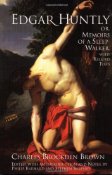
Edgar Huntly, Memoirs of a Sleepwalker
I don’t remember why I picked this book up. All I can recall is stumbling across a reference to it in something else I was reading. Now, after having read the book, I still don’t know what the context was. Oh well, on to the review:
 Edgar Huntly, Memoirs of a Sleepwalker was written in 1799 and so was contemporaneous with the lives of many of the founders. Surprisingly, there is no mention of the American Revolution of any famous characters from the time. Instead it is a simple gothic novel whose intricate plot wends its way through a good deal of moralizing and somewhat pedantic prose (at least to 21st century ears.) Occasionally a sentence or bit of prose does catch the eye. For example,
Edgar Huntly, Memoirs of a Sleepwalker was written in 1799 and so was contemporaneous with the lives of many of the founders. Surprisingly, there is no mention of the American Revolution of any famous characters from the time. Instead it is a simple gothic novel whose intricate plot wends its way through a good deal of moralizing and somewhat pedantic prose (at least to 21st century ears.) Occasionally a sentence or bit of prose does catch the eye. For example,
He seemed to relish no food pure unadulterated evil. He rejoiced in proportion to the depth of that distress of which he was the author.
The story picks up speed and becomes exciting as it progresses. It is fraught with lots of coincidences and some events which are downright implausible. Nonetheless, if the reader can make it through the first third of the book, he will be hooked.
Because the book is, on the whole derived from a supposed letter written to Edgar’s love about a series of unusual events, the writer incorporates a good deal of internal dialog throughout the course of the story. Consequently the reader gets to know the protagonist from the inside out.
Edgar is a likely, but painfully earnest young man who is naive in his attempts to redeem the life of the man he thinks murdered his best friend (the brother of Edgar’s fiancé.) Edgar discovers the tormented Clithero sleepwalking near where his friend Waldegrave was murdered, and assumes that guilt has brought this man to the site of the dark deed. He follows Clithero (who is a laborer at a neighboring farm) to a remote valley accessible only through a cavern and by crossing a perilous gap across a deep chasm through which a torrential stream cascades. By degrees, Edgar elicits the man’s story, which has absolutely nothing to do with the death of his friend Waldegrave. This left this reader a little confused at first. What seemed initially to be a backstory quickly morphs into the main story, leaving Waldegrave in the dirt, so to speak.
In some of the unlikely coincidences mentioned earlier, it turns out that Clithero is connected to a close friend of Edgar, a sort of patron like in Dickens’ Great Expectations. In another reveal toward the end of the story it turns out that Edgar himself is a sleepwalker!
When Edgar awakens from one of his nocturnal jaunts, confused and bruised in the bottom of a pit in cave, the story begins to get pretty interesting. Edgar quickly comes to terms with being a natural born commando and dispatches a whole troop of indians through courage, luck and pluck, despite being unarmed at the onset of the contest. Edgar briefly laments the necessity of killing so many savages, but quickly rationalizes his deeds and doesn’t spend too much time worrying about it. That’s a good thing.
The story ends rather abruptly as the author apparently couldn’t figure out what to do with the hapless Clithero, who, for a good chunk of the story, becomes an afterthought. The ending of the story either leaves the reader with the opinion that Edgar was completely mistaken about the character of Clithero, or that the author simply got tired and dispensed with the character as way to draw the book to a (Neal Stephenson-like) close.
In conclusion, if you liked Great Expectations, Les Miserables, and books of that sort, you will probably like Memoirs of a Sleepwalker. If you don’t, you won’t. I still can’t figure out why I read it.
 The posts are coming!
The posts are coming!

0 comments
Kick things off by filling out the form below.
Leave a Comment